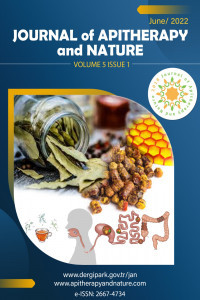New Antiproliferative Acyl Glycerols from New Zealand Propolis and Source Poplar Resin
New Antiproliferative Acyl Glycerols from New Zealand Propolis and Source Poplar Resin
New Zealand Propolis, Acyl Glycerols, Antiproliferative,
___
- 1. Catchpole, O., Mitchell, K., Bloor, S., Davis, P., Suddes, A. (2015). Antiproliferative activity of New Zealand propolis and phenolic compounds vs human colorectal adenocarcinoma cells. Fitoterapia. 106, 3257: 167-174
- Yayın Aralığı: Yılda 2 Sayı
- Başlangıç: 2018
- Yayıncı: Oktay YILDIZ
Emerging Impact of Bee Propolis for Gut Health: Evidence and Mechanisms
Kai WANG, Xiaolu JIN, Qiangqiang LI, Alexandra Christine Helena Frankland SAWAYA, Richard K. Le LEU, LEU4, Michael A. CONLON, Liming WU, Fuliang HU
Quantitative and Qualitative Variations in Propolis Collection
C. TANANAKI, A. THRASYVOULOU, D. KANELIS, V. LIOLIOS
Ana Sofia P. FREITAS, Ana João P. GOMES, Ana CUNHA, Rui P. S. OLIVEIRA, Cristina ALMEIDA-AGUIAR
Toothpaste with Propolis “Apident” Shows Antimicrobial Activity in vitro
Klemen RIHAR, Dunja Gregorič EXEL, Adriana PEREYRA, Rok KOPINČ, Bratko FILIPIČ
Isolated Xanthones from Lisotrigona furva Propolis in Vietnam
Le Nguyen THANH, Ha Thi THOA, Vu Thi Kim OANH, Diep Thi Lan PHUONG, Hoang Thi VAN, Nguyen Quynh CHI, Tran Huu GIAP, Nguyen Thi Tu OANH, Nguyen Thi Minh HANG, Nguyen Van HUNG, Chau Van MINH, Vassya BANKOVA
Determination of Phenolic Acids in Raw Propolis Using Near Infrared Spectroscopy
Ana María VIVAR-QUINTANA, İsabel REVILLA, María İnmaculada GONZÁLEZ-MARTÍN, Eddy Valentín BETANCES-SALCEDO
Shankar KATEKHAYE, Hugo FEARNLEY, James FEARNLEY, Anant PARADKAR
Antioxidant Activities of Propolis from Aragón (Spain)
M. Teresa SANCHO, Sandra M. OSÉS, Andrea RODRÍGUEZ-FERNÁNDEZ, Miguel A. FERNÁNDEZ-MUIÑO, Consuelo PÉREZ-ARQUILLUÉ, Regina LÁZARO, Susana BAYARRI
İbrahim PALABIYIK, Didem SOZERI ATIK, Esra BOLUK, Sevgi KOLAYLI
